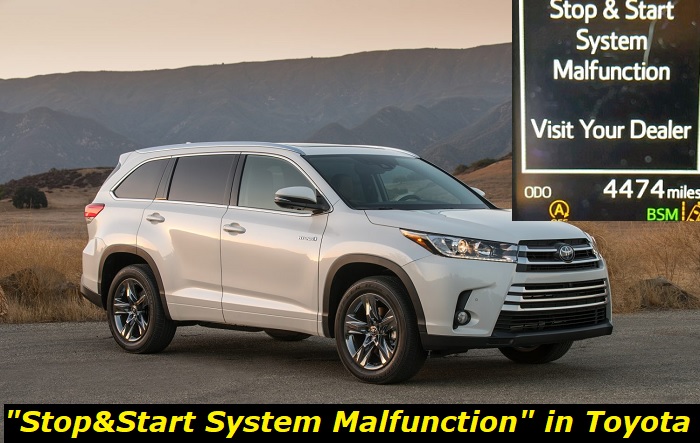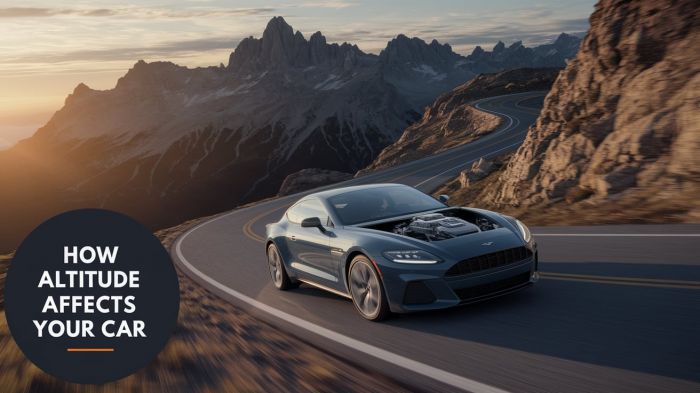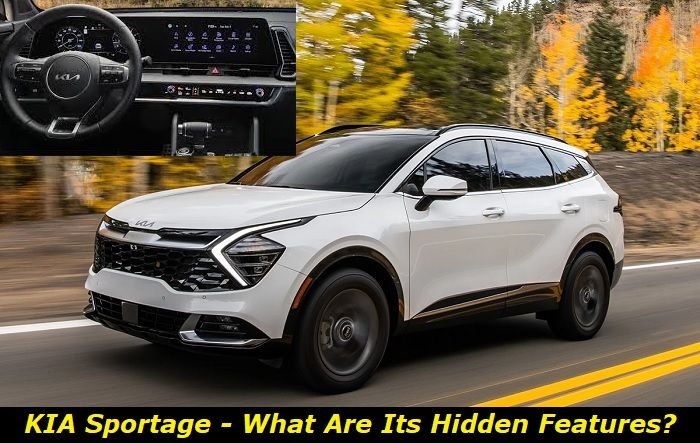Toyota is among the most popular car brands in the world. Given its stellar performance and cost-efficiency, it's no wonder so many people opt for this car. However, each car has its issues. Some arise because your car's simply too old. Others are design oversights. Regardless, neither one is fun to deal with.
Stop & Start system malfunction message highlights
- Common reasons:12V battery low, one of engine sensors failing, electronic glitch
- How to fix:check the voltage on the battery terminals, disconnect the battery for some time
- Possible consequences:this may lead to total death of the battery
- Priority level:Medium
- Can you drive?Yes
- DIY repair:Possible
- Repair price range:$200-$550

Does my Toyota Need a Stop/Start System?
A stop/start system turns the engine off when it would be idling otherwise. Once it's time to move again, it automatically turns it back on. Its primary purpose is to reduce carbon emissions and fuel consumption. Although this doesn't help much on the highway, it's extremely useful in urban settings. Because people spend the majority of their time waiting at traffic junctions, this system can conserve a lot of fuel.
With these benefits in mind, it's no wonder Toyota chose to implement the stop/start system into their models. To understand the issues that arise when the system malfunctions, you must first learn how it works.
The system is connected to a computer that detects when your car's moving and whether the clutch's in neutral or not. In automatic Toyota models, it checks for brake pedal pressure instead. If these conditions check, the system cuts the fuel supply to the engine until you want to move again.
If the system malfunctions, then it won't turn the engine on and off as needed. However, this issue is more of a nuisance than a huge problem - in most models, you can switch the system on and off as you need. Thus, you can still drive your Toyota without it. But odds are you got used to this automatic feature and you don't wish to lose it. In the next section, we will tell you the common reasons why the stop/start system might not work and how to fix it.
Why is your Toyota Auto Stop/Start System Not Working - Non-battery-related issues
Before you take your car back to the dealership, go through make sure you check out these 4 common reasons why your Toyota stop/start system doesn't work. Some of them are quite trivial and easy to fix!
- Seatbelts Unfastened
Sometimes, the stop/start system in your Toyota might not work just because you forgot to wear your seatbelt. Although it can sound banal, it's an extra measure designed to increase your safety. Make sure other passengers have fastened their seatbelts too.
- Steep Slope
When driving uphill, the system is known to act up. Unfortunately, this isn't something you can fix. If it happens only when you drive up, then you don't have to worry about any additional problems. The system should jump back on once you pass it.
- Open Car Doors and/or Hood
The system checks whether your Toyota is ready to be driven or not. Much like seatbelts, it checks whether your doors and hood are properly closed. If even one is slightly open, it might not start. Driving this way is dangerous so always make sure you close every door before you drive.
- Parking assistant online
Many Toyotas have some kind of parking assistance installed these days. While it does make parking significantly easier, you might forget to switch it off every once in a while. When it's active, your stop/start system won't work until you turn it off.
- Computer malfunction
The stop/start system is controlled by a computer. Various programs work together to ensure smooth operations. In the worst-case scenario, the computer itself might be the problematic part. If so, it's time to take your Toyota to a mechanic.
- Design oversight
In April 2020, Toyota issued a recall on their Highlander models. These SUVs had problematic stop/start systems that caused them to turn the engine off even in motion. If you own a Toyota Highlander made before this date, consider visiting your dealership. This issue is serious and might lead to accidents.
Battery-related issues that might cause your Toyota Stop/Start system to malfunction
Since the system needs electricity to work, any change in the power supply can affect its performance. Thus, your car battery is the main component to focus on.
- Battery Overload
Since your car has just a single battery that has to supply various electronics, you can overload it if you aren't careful. Perhaps the most demanding component is ventilation. If it is too hot or cold outside, the fan begins working overtime. As a result, it will soak up most of the power and the stop/start system will shut down.
Unfortunately, this issue is a matter of design. The best thing you can do is to be mindful of how much pressure you put on your battery. Some Toyota models are designed to overcome this issue. Instead of disabling the stop/start system, the A/C will simply run on lower settings.
- High or Low Engine Temperature
When you first start your Toyota in the morning, its engine will likely be cool. Thus, it will require more electric current initially to get going. During this time, the stop/start system might not work since it's lower on the priority list.
The same thing can occur when the engine overheats. Since high engine temperatures are dangerous, your vehicle will direct most of its power to the cooling fan. This can happen if you stop after long drives.
- Low Battery Charge
It's never a good idea to allow your battery to drain. This usually happens when you leave your Toyota untouched for a long time. When you finally start it, it won't have enough power to supply every component. Thus, it will conserve power just to start the engine and leave non-vital components disabled. This includes the start/stop System.
Leaving your headlights and interior light on by accident will also drain your battery. Always double-check whether you forgot to switch them off.
Your battery also drains faster in cold weather. So if your stop/start system acts jumpy in winter months, it might just be the cold.
- Damaged battery
If your battery isn't sufficiently charged even though you drive your Toyota often, then it might be faulty. Batteries have a limited lifespan so consider getting them replaced. Alternatively, it might not be installed properly. This negatively impacts every electronic in your Toyota.
Inspect your battery and look for corroded connectors. They might sometimes be accompanied by the smell of rotten eggs. This happens when the sulfuric acid starts leaking. The battery might also become contorted.
Apart from the stop/start system, a bad battery will affect components such as headlights and A/C too. If multiple electronics start acting up, then you should replace your battery.
- Faulty Alternator
The alternator supplies your electronics with power while the car's in motion. It also recharges the battery. If your stop/start system malfunctions and your battery seems to be fine, then it's time to check out your alternator.
- Wrong battery type
It's easy to forget that stop/start cars require appropriate batteries. These stop/start batteries are designed to handle the constant starting and turning off of the engine. Standard batteries provide a large initial current to the car. After this, the alternator recharges them. If you use them on your start/stop Toyota, they won't be able to keep up with the demand and might cause the system to shut down.
- Broken Battery Sensor
A battery sensor is necessary for the system to acknowledge a new battery. If it's faulty, some features might not work despite the newly installed battery. However, this scenario is very unlikely and we suggest first checking any of the aforementioned causes. But in case your battery is the root of the issue, then you'll need the help of a mechanic.
Conclusion
Stop/start Toyota models provide several advantages. Not only do they help conserve fuel but they are also eco-friendly. But much like any car component, this system can act up at times. Usually, it's because of something minor such as an unfastened seatbelt or open door. The system also doesn't handle steep hills well.
However, if the issue persists, then there's likely something off with the battery. The stop/start system requires an electric current to function. When it doesn't get enough power, it won't work. This can happen if you overload the circuit with A/C or engine cooling fan. Your battery might be depleted in which case multiple electronic can shut down.
In 2020, Toyota recalled the Highlander because of its faulty design. The stop/start system would sometimes randomly shut off the engine even when the car was moving.
Fixing this problem revolves mostly around checking your battery. If this doesn't help, then the computer can be damaged and you'll have to visit a mechanic.
About the authors
The CarAraC research team is composed of seasoned auto mechanics and automotive industry professionals, including individuals with advanced degrees and certifications in their field. Our team members boast prestigious credentials, reflecting their extensive knowledge and skills. These qualifications include: IMI: Institute of the Motor Industry, ASE-Certified Master Automobile Technicians; Coventry University, Graduate of MA in Automotive Journalism; Politecnico di Torino, Italy, MS Automotive Engineering; Ss. Cyril and Methodius University in Skopje, Mechanical University in Skopje; TOC Automotive College; DHA Suffa University, Department of Mechanical Engineering






Add comment